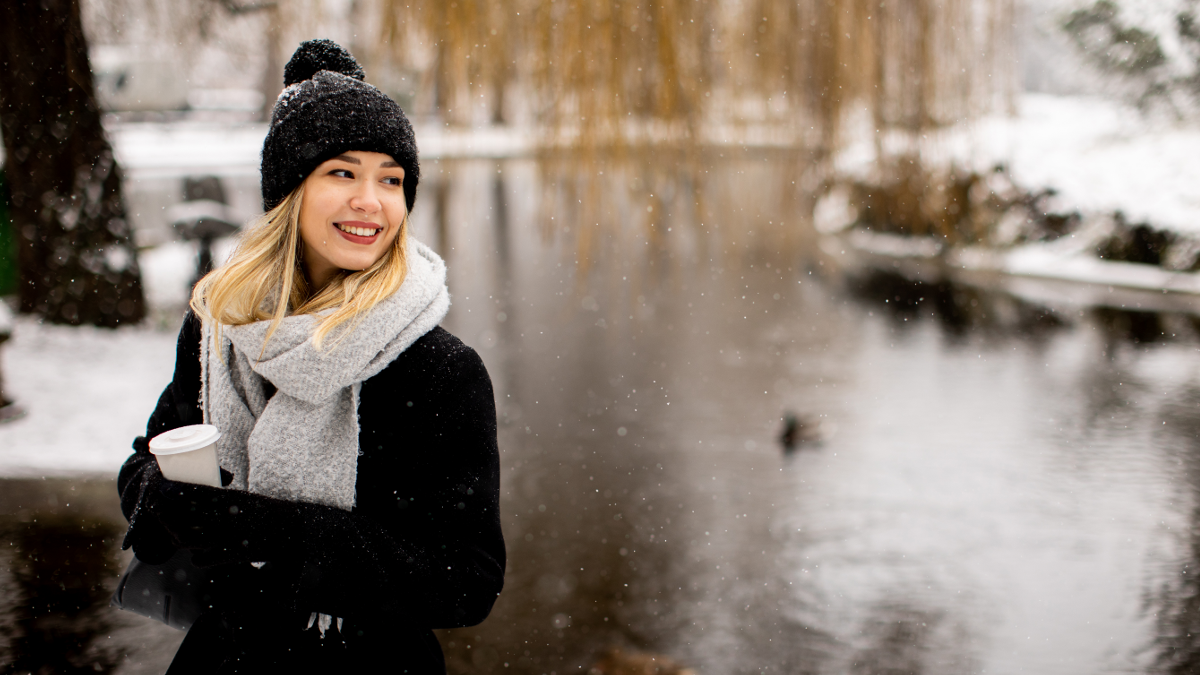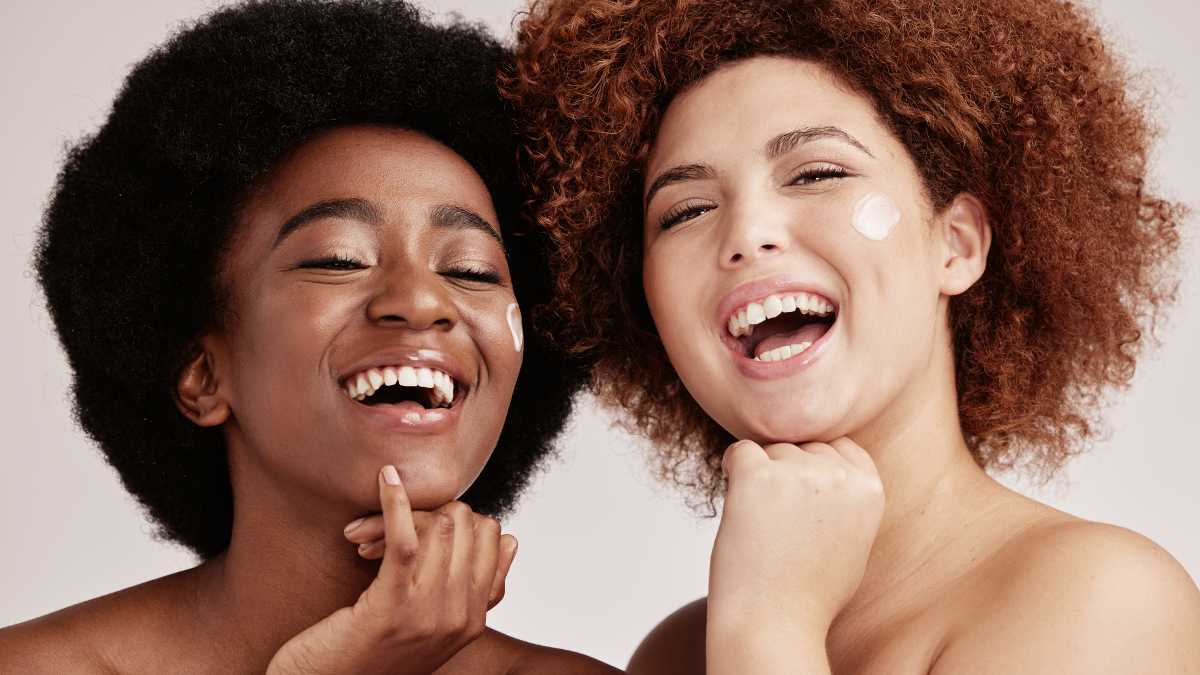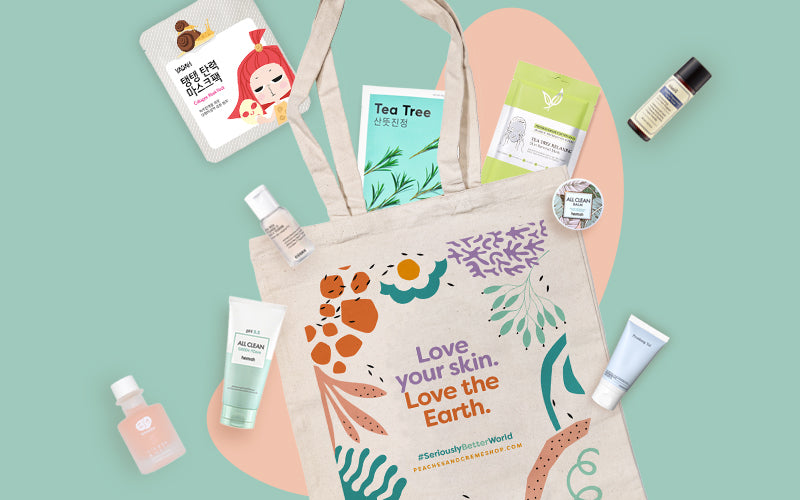Winter Skincare: Brave the cold with good, healthy skin
Fluffy snow, longer nights, and colder weather all day long—winter is finally upon us.
This beautiful season comes hand-in-hand with the holidays and the new year which has us busy with life. And our skin? It’s facing a not-so-fun battle against the weather, attacks on its protective barrier, and irritation.
The cold and freezing winds are wreaking havoc on your skin right now. To protect it and achieve a healthy glow throughout the season, read our winter skincare guide below.
What the cold does to your skin
Let’s start with what happens to your skin when temperatures drop. In the winter, the weather gets cold and humidity in the air declines so we get drier air. This makes it difficult for our skin to retain moisture. Why? There isn’t enough hydration in the atmosphere and the water that our skin naturally produces is quickly lost to the air. These factors together lead to dry skin which can then branch out to itchiness, scaling, flaking, and more noticeable fine lines and wrinkles.
It doesn’t end there, however, since our transition to the colder weather also disrupts our skin’s protective barrier. This means higher risks of irritation, inflammation, and acne breakouts. Winter is a beautiful season but it also means putting in extra work and effort into our skincare.
How to keep your skin healthy during winter

Prepping for the cold weather and dry air is key to keeping your skin happy and healthy. Here are some easy yet important tips to get you started.
1. Double cleanse but opt for gentler cleansers
We are firm believers in double cleansing to ensure that your skin is clean and free from dirt, especially when you’ve been wearing makeup and sunscreen. A lot of people think that we need to cleanse less when the days are cold since skin gets dry, we don’t sweat much, and a lot of winter activities are indoors—but that’s not true. You still need to wash your face regularly; you should just choose gentler cleansers to keep your skin moisturised.
There are many options for your first cleanse like micellar or cleansing water. However, we recommend using an oil or balm cleanser during winter. These types of cleansers—especially Korean skincare ones—are gentle and contain oils and emollients that nourish the skin as they break down makeup, dirt, and irritants. With these cleansers, you avoid stripping your skin of natural oils and that tight feeling you get when a skincare product is too harsh.
For your second cleanse, it's best to stick to a gentle yet moisturising water-based cleanser. You can choose a cream or foam type to help soften skin and retain moisture.
2. Snowflakes over dandruff flakes
The dry winter air can also cause dandruff or worsen your case if you already have it. This leads to an itchy scalp, oily hair, and a sprinkling of flakes everywhere—the kind that isn't as pretty as snowflakes. To help you out, we recommend switching to an anti-dandruff shampoo that is not too harsh and to try double cleansing your scalp. This makes sure that the dirt, oil, and dead skin cells are broken down and properly washed off. When shampooing, focus on your scalp since the bubbles are enough to clean your hair and lathering directly onto it can cause dryness. On the other end of the spectrum, it's best to apply your conditioners and treatments from your hair's roots down to its tips while avoiding the scalp to prevent congestion, dandruff, and excessive oiliness. These products repair and moisturise hair follicles so they would only overburden your scalp.
We also recommend that you avoid using hot water during your showers. Now, we know that winter can get really cold so it's best to take shorter showers (this helps prevent dry skin too). After your wash, you can use scalp oils and ampoules to give your hair a hydration boost.
3. Hydrate like there’s no tomorrow
We’ve placed a lot of emphasis on moisture but she’s not the only star this season. You also need to hydrate to protect your skin from damage or irritation. Incorporate hydrators and more humectants into your skincare routine to make up for the cold and dry air.
Humectants are ingredients that attract or pull in water from the atmosphere to hold it within the upper layers of the skin. They also create a water-binding film on the skin’s surface to lock in moisture. Common humectants in skincare—especially K-beauty—are hyaluronic acid, glycerin, honey, collagen, aloe vera, amino acids, and peptides.
Ways to add more hydration to your skincare
Hydrating cleansers and toners are a given during winter. To supplement these steps and prevent dehydrated skin, here are some things you can add to your skincare routine.
- Sheet masks
Masks are soaked in ampoules, serums, or essences to give your skin a supercharged hit of hydration, moisture, or actives. For intense hydration, it’s best to opt for masks with hyaluronic acid. This well-known and well-loved humectant hydrates and moisturises which gives you a bevy of skincare benefits: enhanced skin elasticity, less noticeable wrinkles and fine lines, and a strengthened skin barrier.
- Essences
An essence has two main roles in skincare: (1) deliver serious hydration to your skin, deep within your pores and (2) restore your skin’s moisture balance since it can be disrupted during cleansing and toning.
- Face mists
Mists are handy things to have since they’re a few spritz of extra hydration in between hours. They are quick ways to freshen up and rehydrate when you’re out and about or busy with work or school.
4. Amp up your moisturising game
We’ve established that the lack of moisture is your biggest hurdle to achieving and maintaining healthy skin during winter. Knowing this is already a good start so our next move is taking proper steps to moisturising your skin.

Switch to thicker and more nourishing moisturisers
Winter is the best season to go for richer or heavier moisturisers to soothe and plump up dry skin.
If you have oily skin, moisturising is still important to keep your skin healthy and balanced. Instead of heavy creams, you can switch to a lightweight or gel-cream moisturiser to make sure that you are giving your skin the extra care it needs.
Break out the facial oils and balms
This tip goes out to our dry skinned friends who are struggling this winter. Facial oils can save your skin during the season since they place heavier focus on moisture. While some of its skincare benefits vary depending on the specific oil you use, facial oils generally nourish your skin for a softer and smoother texture. They seal moisture in, preventing dehydration and protecting your skin barrier.
You can elevate your winter skincare by supplementing your moisturiser with facial oil. Moisturisers create a protective film over your skin to lock in moisture and hydration, and prevent your skin from flaking (remember: moisture vs. hydration). However—for dry skin types, especially in winter—moisturisers might not be enough to nourish dry, parched, flaky skin, so face oils are the way to go.
How do you layer and incorporate a facial oil into your skincare routine? It's always the last step since the protective barrier it creates prevents your skin from absorbing other skincare products. If you're not a fan of layering too many products, you can also mix your facial oil and moisturiser before applying it to your skin.
For those who don't like the facial oil's texture, you can try a facial balm (not a cleansing balm). You can think of it as a more intense and concentrated moisturiser without water so it leans more towards nourishing and protecting your skin. Apply your facial balm with a light hand and only use a small amount.
Skincare ingredients for maximum moisture
The beauty of Korean skincare is that you have so many choices for different needs and goals. Since we’re focusing on moisture right now, you can try out K-beauty products with the following ingredients:
- Ceramides – These are emollients which improve the overall health of skin cells, lock in moisture, and create a barrier that prevents moisture from evaporating while protecting your skin against environmental damage.
- Glycerin – We’ve mentioned this ingredient a few times before. It is a popular humectant that pulls the skin’s natural moisture to the surface and helps improve fine lines and wrinkles. It is also suitable for those with sensitive skin since it is gentle and skin-friendly.
- Shea Butter – This is a natural ingredient which is easily absorbed so it does not leave skin oily. Shea butter boosts collagen production which provides moisture that it then seals in. It also has anti-inflammatory and antioxidant properties.
Sleeping packs—they pack a mighty punch
Sleeping packs (a.k.a. sleeping masks or overnight face masks) are essential skincare products in the winter, especially since the nights are longer and colder. They provide intense hydration and moisture so you can wake up with soft, bouncy skin that feels like mochi.
Wondering how sleep masks are different from regular moisturisers? They are formulated to be absorbed deeply over time as you sleep. Sleep masks also seal in moisture and the other active ingredients that you’ve used during your skincare routine. Lastly, they act as a protective barrier against dirt, dust, and other skin irritants.
5. Don’t forget your sunscreen
It is a truth universally acknowledged that you should apply sunscreen daily without fail—rain or shine and no matter the weather or the season. Sun damage is still possible despite the overcast clouds in the winter. In fact, your chances of sunburn are higher during winter because UV rays are intensified when reflected off of snow. Your sunscreen also evaporates faster because of the dry air which means you need to re-apply several times a day.
Sun damage accumulates over time so you lower the risk of skin problems and skin cancer by maintaining steady and consistent sun protection and decreasing your exposure to it. The benefits of applying sunscreen does not end there, however. A robust sun care routine keeps your skin healthy and youthful—it’s an essential step to well-aging.
6. Plug in a humidifier
Winter comes with an unfortunate double whammy: both indoor heating and the cold weather causes drier air. A humidifier helps alleviate the extremely dry indoor air by giving you a way to control humidity levels in a room.
Just make sure to clean it regularly to avoid bacteria growth which can also pollute the air.
7. Kiss chapped lips goodbye
When your skin is dry or dehydrated, your lips follow. This leaves you with chapped or cracked lips that can sometimes be painful and uncomfortable. When this happens, avoid licking your lips to “moisturise” them since the digestive enzymes in our saliva can exacerbate dryness and cause cracks over time.
It’s best to use and always carry a lip balm to keep your kissers petal-like. At night, you can apply lip masks or essences so you wake up with soft, soft lips.

Nothing is really perfect, especially when it comes to skin. Breakouts, dry, or oily skin are normal. We've gathered these tips so you and your skin can stay happy and healthy during this freezing season. Have a holly, jolly winter!









Leave a comment